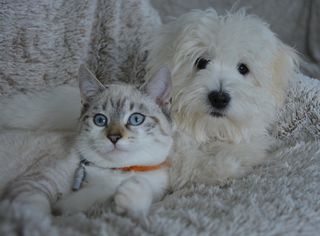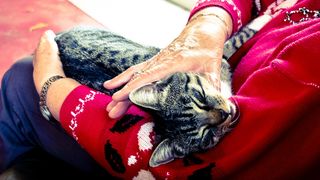Depression
Take Antidepressants, Get Therapy, and... Adopt a Pet?
Pet adoption can augment medication response in treatment-resistant depression.
Posted August 8, 2018

A new study shows that adopting a pet may enhance the effect of medication in unresponsive depression.
Depression
Depression, or more specifically major depressive disorder, is a mental illness characterized by mood regulation difficulties. Major depressive disorder is also associated with loss of energy, concentration difficulties, lack of interest in previously pleasurable activities, feelings of sadness and hopelessness, significant negative changes to sleep and appetite, feelings of guilt or worthlessness, preoccupation with thoughts of death, etc.1
During a single year, depression occurs in almost 7 percent of Americans, a larger portion of which are women—depression is 1.5 to 3 times more common in women than men.2
Treatments
Research has shown that both medication and psychotherapy can be helpful in treating depression.
A number of medications, including selective serotonin reuptake inhibitors (SSRIs) such as Prozac and serotonin and noradrenaline reuptake inhibitors (SNRIs) such as Cymbalta, have been shown to be effective in the pharmacological treatment of depression.3
Similarly, a number of psychological interventions—such as cognitive-behavioral therapy, interpersonal therapy, and behavioral activation—are also considered beneficial in treating depression.4
Sometimes, however, depression does not respond to treatment.Treatment-resistant depression (TRD) has been more recently defined as depression that does not respond to two or more adequate trials of different medications or psychological therapies.5

A number of treatment options for TRD are available and may help. These include switching medications, combining them (e.g., an SSRI medication with an atypical antipsychotic drug), or combining medication and psychotherapy. Less commonly used options are electroconvulsive therapy (ECT), vagus nerve stimulation, repetitive transcranial magnetic stimulation (rTMS), and, finally, psychosurgery.6
But we may be overlooking another possibility, one that is perhaps less complicated, expensive, and risky.
Pet ownership has a number of potential advantages. Pets can keep lonely people company and serve as catalysts for friendship formation. Many pet owners also find that they get more exercise (e.g., they need to walk their dogs), and that caring for and loving their pets has made their life more meaningful. A number of studies have shown the benefits of regular interaction with animals and pet ownership. To illustrate, a 1992 study found that pet ownership is associated with lower levels of risk factors for heart disease.7
In the present study, Pereira and Fonte attempted to determine if pet adoption could be helpful for people with treatment-resistant depression as well.1

The New Research
Initially, the researchers contacted 80 patients (50 females and 30 males) who had treatment-resistant depression, and had been receiving medication treatment for nine to 15 months without any improvement. The researchers encouraged these patients to adopt a pet.
Of these patients, 33 (25 females and 8 males) agreed to adopt a pet. For comparison purposes, the researchers used another 33 individuals who were randomly drawn from the remaining patients—of the ones who did not adopt or already own any pets—to serve as a control group (henceforth known as the non-pet group).
Among the 33 who accepted the pet adoption suggestion, 18 adopted a dog, 7 adopted two dogs, and 7 adopted one cat. The pet and non-pet groups maintained the same medication treatment as before. Neither group was aware of the other’s existence.
The patients were evaluated several times over the following three months. One of the main measures used was the Hamilton Depression Rating Scale (HAMD-17), which includes questions related to guilt, insomnia, and other depressive symptoms. Scoring over 23 on this measure is usually associated with severe depression, while scoring less than 7 indicates an absence of depression.
The results, at the end of the 12 weeks, showed that the pet group had made significant improvements, both in comparison to the beginning of the study, but also in comparison to the non-pet group.
For example, one-third of the pet group no longer met the criteria for depression (i.e., they scored less than 7 on HAMD-17). The group’s scores on HAMD-17 began to decrease one month into the study, and by the second month, the scores were significantly different from those of the non-pet group.
These results appear to show that pet adoption is helpful in managing treatment-resistant depression. Nevertheless, we must be cautious in interpreting the results, given that the study did not include random assignment. In other words, we cannot be certain that pet ownership was the only major difference between the groups and thus responsible for the different outcomes.

Still, these results are promising, and add to previous research findings that show the benefits of interaction with animals.
Perhaps one day, along with recommendations for new medication combinations or more drastic measures like ECT, a doctor will pull out a prescription pad and write: “I highly recommend that you get yourself an adorable cat or dog."
References
1. Mota Pereira, J., & Fonte, D. (in press). Pets enhance antidepressant pharmacotherapy effects in patients with treatment resistant major depressive disorder. Journal of Psychiatric Research. doi: 10.1016/j.jpsychires.2018.07.004.
2. American Psychiatric Association. (2013). Diagnostic and statistical manual of mental disorders (5th ed.). Arlington, VA: Author.
3. Kennedy, S. H., Lam, R. W., McIntyre, R. S., Tourjman, S. V., Bhat, V., Blier, P.,...Uher, R. (2016). Canadian Network for Mood and Anxiety Treatments (CANMAT) 2016 clinical guidelines for the management of adults with major depressive disorder: Section 3. Pharmacological treatments. Canadian Journal of Psychiatry, 61, 540-60.
4. Parikh, S. V., Quilty, L. C., Ravitz, P., Rosenbluth, M., Pavlova, B., Grigoriadis, S., ... Uher, R. (2016). Canadian Network for Mood and Anxiety Treatments (CANMAT) 2016 clinical guidelines for the management of adults with major depressive disorder: Section 2. Psychological treatments. Canadian Journal of Psychiatry, 61, 524-539.
5. Conway, C. R., George, M. S., Sackeim, H. A. (2017). Toward an evidence-based, operational definition of treatment-resistant depression: When enough is enough. JAMA Psychiatry, 74, 9–10.
6. Keitner, G. I., Mansfield, A. K. (2012). Management of treatment-resistant depression. Psychiatric Clinics of North America, 35, 249-265.
7. Anderson, W. P., Reid, C. M. & Jennings, G. L. (1992). Pet ownership and risk factors for cardiovascular disease. Medical journal of Australia, 157, 298–301.




